Grieving Traders Count Their Losses At Maiduguri Market Destroyed By Fire
More than 30,000 traders lost all their goods when fire gutted the main market in Maiduguri, northeast Nigeria, last week. Many who spoke to HumAngle as they visited the wreckage of the market counted their losses in millions of naira.
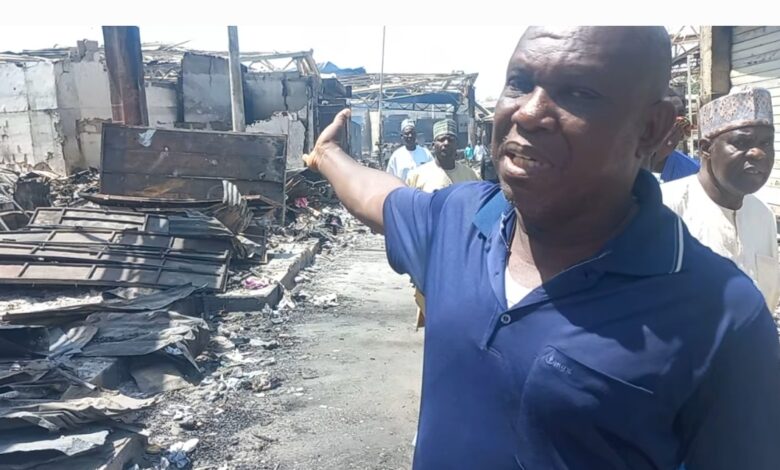
“Nothing was spared in my shop – everything went down in the ashes,” said Mohammed Alibe, who owns a general provision store.
He dashed to the scene of the fire that engulfed Maiduguri’s leading market when he heard the news. But it was too late.
“How much would one carry in such a cacophonous moment?” he added, wondering if he could have saved anything.
The inferno that razed the entire complex of the leading market in Maiduguri, northeast Nigeria, in the early hours of Sunday, Feb. 26, has left tens of thousands of traders with nothing but sorrow, tears, and unimaginable losses.
HumAngle reported how the fire erupted on election day when traders closed their shops in order to cast their ballots in the concluded presidential and National Assembly elections.
Established in March 1979 and officially known as Monday Market Limited, the trading centre is one of the biggest in the northeast.
Before the incident, Monday Market was crowded. The complex had a capacity of 13,000 shops that held tens of thousands of traders. Hundreds of thousands of buyers visited every day.
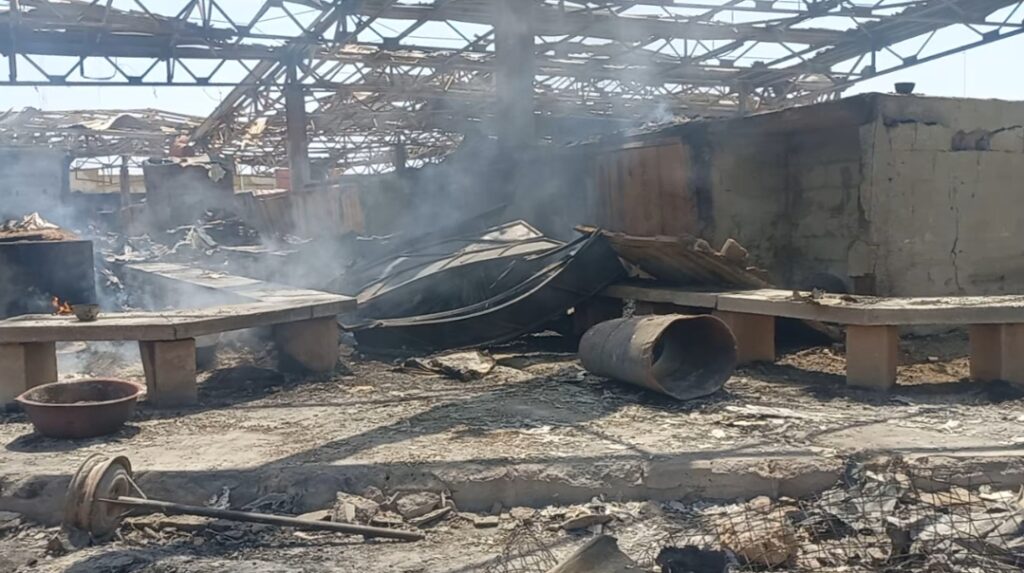
Officials said the market is the “heartbeat of Borno state’s economy”.
When the market shut down at 6 p.m. on Friday, Feb. 24, most traders looked forward to resuming their business after the election.
Witnesses gave different accounts of the time the suspicious fire started.
“I was at the vote collation centre when someone called my attention at about 1 a.m. that the market was on fire,” said Musatapha Loskuri, the General Manager of Maiduguri Monday Market.
A local security guard at one of the shopping complexes adjacent to the burnt market said he began to see the brightness caused by the flame of the fire “at about midnight”.
Ashes
Regardless of when the fire started, it did not stop until the entire market was burned to ashes.
Most of the traders were forced out of their beds and made it to the market in the early hours of Monday. Some managed to brave the flames in order to salvage their properties.
Pious, the chairman of Igbo traders in the market, has been trading in fabrics for over 30 years at the market. On the day of the fire, he said he closed early after spending the whole day clearing his goods at the bus station.
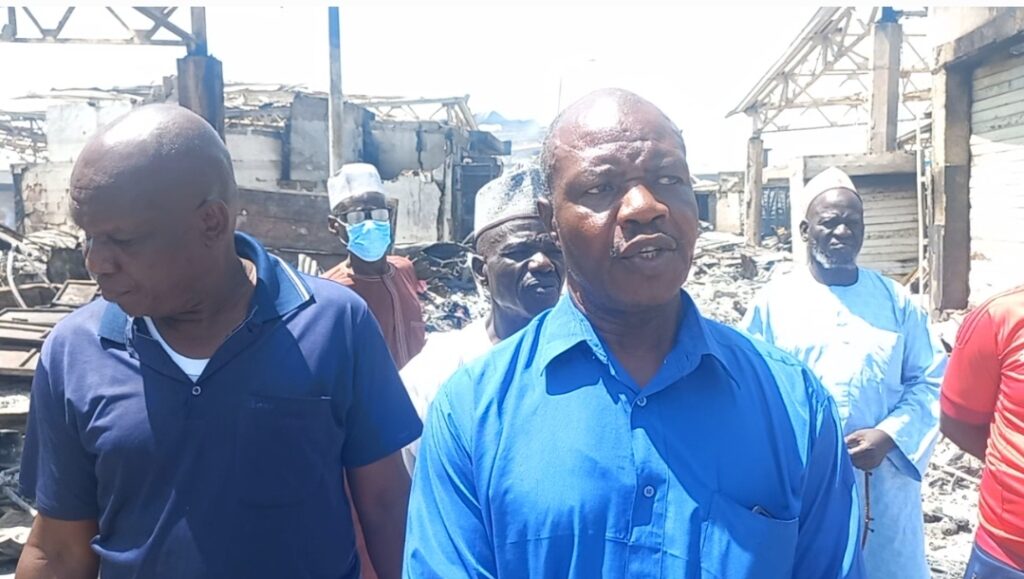
“When I came to the market late in the afternoon on Friday from where I went to pick up the goods sent to me from Lagos, I decided to dump the goods in the shops and left home with the thought that I would return on Monday to open the bale for sales,” he recalled.
“I got a call at about 4 a.m. that the market was on fire. I arrived at the market about 30 minutes later, only to behold massive flames rising from the market.
‘Lost everything’
“At that point, I knew I had lost everything; yes, I lost over N8 million to the fire.”
The incident was a first-time experience for Pious.
“I came here on Apr. 12, 1991, during the election of Moshood Abiola and Bashir Toffa. There used to be some minor cases of fire here, but this was unprecedented.”
Madam Agnes, a mother of four, who used to sell all kinds of spices and plastic kitchen utensils, had two shops, one a parking store, before the fire incident.
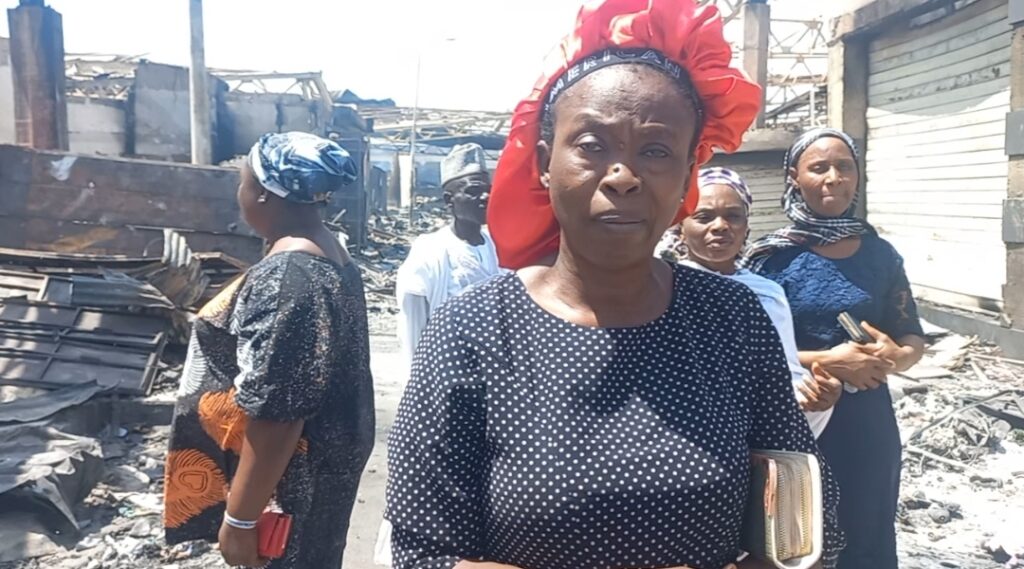
“I was left in shock early Sunday morning when I was told that the market was burnt,” she said.
“I had two shops there; one was my parking store. The shops were well stocked, but all were burnt down,” said Madam Agnes, who estimated her loss to be about N5 million.
Temi Tope, another female trader who used to own a grocery and provision shop in the market, is another victim.
“My loss in that burnt shop is more than N2.5 million, ” she said.
Nothing left
Amaka Anazodo, who is in her fifties, was still emotional when she spoke. The mother of five, whose children live with her in Maiduguri, said she has been a merchant of foodstuff and plastic utensils in the market “for about 17 years.”
“That’s what I have been using to fend for my family all this while; now everything is gone, and I’m left with nothing,” she said.
Rakiya Mohammed, another mother of five children, trades in “female fabrics and already made gowns”.
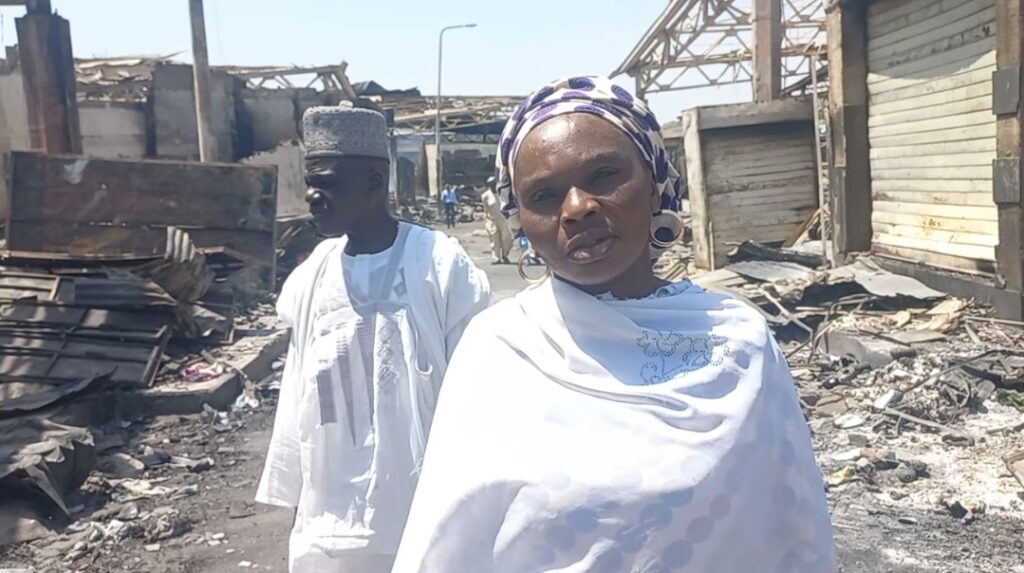
“I still can’t understand how this calamity came to befall us,” she said.
“I’m just a poor woman struggling to earn a decent living and provide for my five children. The shop and what we sell has been our only source of hope and survival, but now everything, worth about N3.5 million, has gone with the fire.”
Like Rakiya, Happiness Samuel, who is in her late fifties, was not a happy woman as she spoke about the loss she incurred.
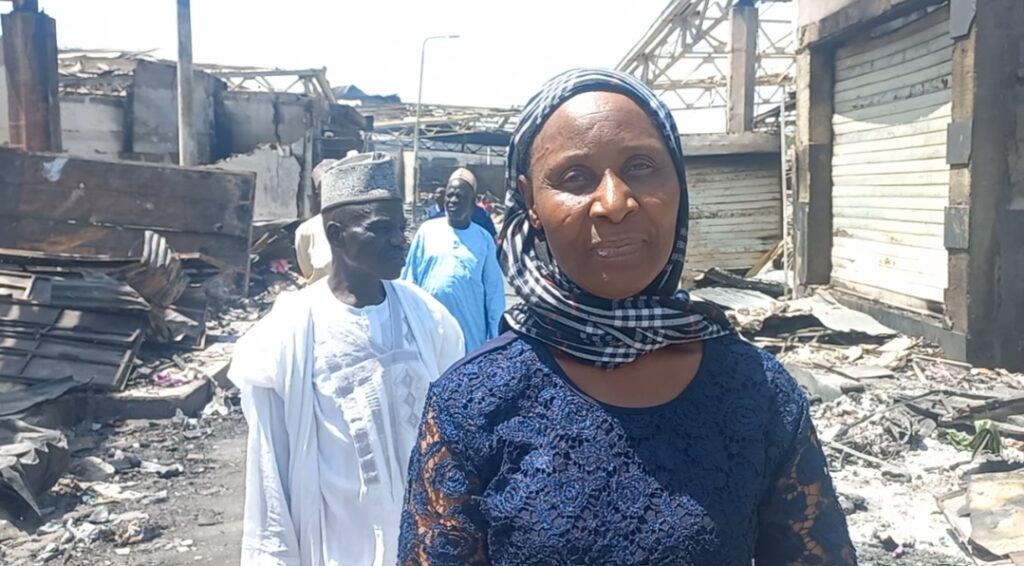
“I sell wrappers like Hollandis, assorted lace fabrics and High Target clothing, ” she told HumAngle. She then uses the proceeds to cater for seven children, most of whom are in higher institutions of learning.
“I have five children and two other boys who are orphans of my deceased relatives. They all live with me and we all depend on the shop in the market to survive,” she said.
“Mine was a fabric shop, and I didn’t see anything left in the shop except the ashes.”
Emeka Darlington, a former chairman of the Igbo traders in Monday market, lost two shops with goods worth N15 million. He has traded in the market for over 39 years.
‘Huge losses’
Then there is Bunu Bukar who has been in the market for about 27 years. As one of the foremost fabric merchants in the market, he owned about 15 shops managed by over 20 staffers, mostly his children.
“I cannot even estimate my losses because it is huge,” he said. “All those shops have gone down with the fire.”
Goni-Bukar Gubio, the Chairman of the Cap Makers and Sellers Association, was a victim too.
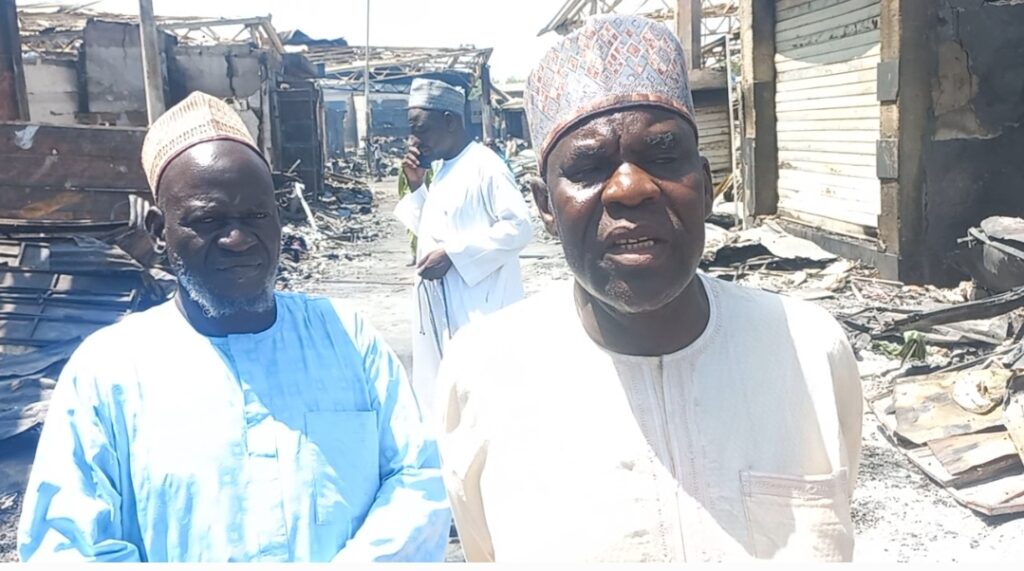
Alhaji Bukar, a foremost fabric merchant, lost goods in 15 shops. Photo credit: Abdulkareem/HumAngle
“It was a massive loss to us, and the volume of which cannot be easily quantified,” he said.
Poor Rescue Effort
Many traders believe the fire that gutted the market wouldn’t have been that bad had the fire service officials responded promptly.
Witnesses on the scene told HumAngle that when the alarm was raised, the fire was small. They wonder if firefighters had responded at the time calls were made, the market would have been saved.
“We called on the fire service people immediately, but it took them about an hour to arrive,” Loskuri, the GM of Monday Market, said.
“At about 12.30 a.m., when we called the fire service, the fire had affected only about ten shops. But they did not come until much later when the fire had gone out of their control.”
A security operative of the state Civilian-JTF who spoke anonymously lamented that “the fire service people should be blamed” for the magnitude of destruction caused by the fire.
“When we called them, they told us pointedly that they don’t have fuel in their vehicles and that until they get their tanks, they won’t be able to respond,” the source said.
Government response
Amidst wild protests by some angry residents around the market who alleged a political link to the incident, the Borno State government announced the release of one billion naira to be distributed to victims of the fire “to serve as emergency relief pending other measures by the government.”
The government had also on Wednesday approved another N1 billion for reconstruction work to start at the Market.
This was disclosed on Wednesday, March 1, when the secretary to the state government, Usman Shuwa, inaugurated a 23-member committee that will coordinate the reconstruction and “all matters relating to the market fire incident.”
The committee, headed by Engr. Zarami Dungus, a retired permanent secretary, was given nine specific terms of reference, which include determining “the immediate and remote causes of the fire as well as the factors responsible for its wild untrollable nature, engulfing the entire market and establishing whether it was the result of arson or accident.”
Presidential Sympathy
The president of Nigeria, Muhammadu Buhari, was also in Maiduguri on Thursday, March 2, to commiserate with the traders over the losses they incurred due to the market fire.
Though President Buhari took a brief tour of the burnt market, he snubbed the victims who had been carefully selected and assembled to be at the market to meet him.
The minister of humanitarian affairs, Sadiya Faruq, who was in the company of the president, had briefed him on the arrangement made by her ministry to distribute 60,000 bags of grains and other food condiments as a palliative to the victims.
The minister said a damage assessment report would be forwarded to the president’s office when it concluded.
Support Our Journalism
There are millions of ordinary people affected by conflict in Africa whose stories are missing in the mainstream media. HumAngle is determined to tell those challenging and under-reported stories, hoping that the people impacted by these conflicts will find the safety and security they deserve.
To ensure that we continue to provide public service coverage, we have a small favour to ask you. We want you to be part of our journalistic endeavour by contributing a token to us.
Your donation will further promote a robust, free, and independent media.
Donate HereStay Closer To The Stories That Matter




